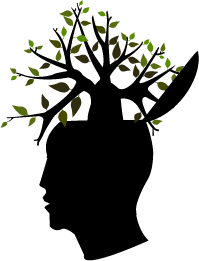What Does It Mean to Be Human?
by Maria Popova, brainpickings.orgSeptember 7th 2012 8:10 PM
by
Primates, philosophers, and how subjectivity ensures the absolute truth of our existence.
 What does it mean to be human? Centuries worth of scientific thought, artistic tradition and spiritual practice have attempted to answer this most fundamental question about our existence. And yet the diversity of views and opinions is so grand it has made that answer remarkably elusive. While we don’t necessarily believe such an “answer” — singular and conclusive by definition — even exists, today we make an effort to understand the wholeness of a human being without compartmentalizing humanity into siloed views of the brain, emotion, morality and so forth. So we look at this complex issue from three separate angles — evolutionary biology, philosophy and neuroscience — hoping weave together a somewhat more holistic understanding of the whole.
What does it mean to be human? Centuries worth of scientific thought, artistic tradition and spiritual practice have attempted to answer this most fundamental question about our existence. And yet the diversity of views and opinions is so grand it has made that answer remarkably elusive. While we don’t necessarily believe such an “answer” — singular and conclusive by definition — even exists, today we make an effort to understand the wholeness of a human being without compartmentalizing humanity into siloed views of the brain, emotion, morality and so forth. So we look at this complex issue from three separate angles — evolutionary biology, philosophy and neuroscience — hoping weave together a somewhat more holistic understanding of the whole.
THE LEAKEY FOUNDATION ON HUMANNESS
From The Leakey Foundation, which aims to increase scientific knowledge and public understanding of human origins, evolution, behavior, and survival, comes What Makes Us Human? — a multifaceted exploration of who we are as a species and how we came to be that way. Barely 8 minutes long, the film features an astounding all-star cast of scientists — Jane Goodall, Robert Sapolsky, Richard Wrangham, Steven Pinker, Eugenie Scott and more — and tackles a number of complex concepts related to consciousness and the essence of being human.
There is a lot more biology to our behavior than we used to think.” ~ Richard Wrangham
Though the film is essentially an ad for The Leakey Foundation, that’s more than okay given that over the past half-century, the foundation has stepped up to the government’s consistent failure to properly fund scientific research and practically launched the careers of some of the greatest scientists of our time — Dian Fossey, Birute Galdikas, Don Johanson, Richard Wrangham, Daniel Lieberman, and even Jane Goodall herself.
DAN DENNETT ON CONSCIOUSNESS
Dan Dennett is one of today’s most prominent and prolific philosophers. In this excellent 2003 TED talk, he exposes the flawed and often downright misleading way in which we (mis)understand our consciousness, perpetuated by the many tricks our brains play on us.
It’s very hard to change people’s minds about something like consciousness, and I finally figured out the reason for that. The reason for that is that everybody’s an expert on consciousness.” ~ Dan Dennett
For more of Dennett’s illuminating insight, take a look at The Crucible of Consciousness: An Integrated Theory of Mind and Brain, which builds on Dennett’s iconic — and must-read — 1992 book, Consciousness Explained.
ANTONIO DAMASIO ON CONSCIOUSNESS
Neuroscientist Antonio Damasio is among the world’s leading researchers on the neurobiology of mind and behavior, focusing more specifically on emotion, memory, decision-making, communication and creativity. In this compelling BigThink interview, Damasio gives a basic definition of “consciousness”
Consciousness is the special quality of mind, the special features that exist in your mind, that permit us to know, for example, that we ourselves exist and that things exist around us. And that is something more than just your mind. Mind allows us to portray in different sensory modalities — visual, auditory, olfactory, you name it — what we are like and what the world is like, but this very, very important quality of subjectivity is the quality that allows us to take a distant view and say, ‘I am.’” ~ Antonio Damasio
Damasio’s new book, Self Comes to Mind: Constructing the Conscious Brain, comes out in November but is already available for pre-order — which we highly recommend, since it’s an absolute must-read.
Original Page: http://www.brainpickings.org/index.php/2010/09/07/what-does-it-mean-to-be-human/
Shared from Read It Later
Comments
Post a Comment